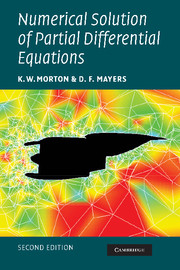Book contents
- Frontmatter
- Contents
- Preface to the first edition
- Preface to the second edition
- 1 Introduction
- 2 Parabolic equations in one space variable
- 3 2-D and 3-D parabolic equations
- 4 Hyperbolic equations in one space dimension
- 5 Consistency, convergence and stability
- 6 Linear second order elliptic equations in two dimensions
- 7 Iterative solution of linear algebraic equations
- References
- Index
- Numerical Solution of Partial Differential Equations
Preface to the first edition
Published online by Cambridge University Press: 05 September 2012
- Frontmatter
- Contents
- Preface to the first edition
- Preface to the second edition
- 1 Introduction
- 2 Parabolic equations in one space variable
- 3 2-D and 3-D parabolic equations
- 4 Hyperbolic equations in one space dimension
- 5 Consistency, convergence and stability
- 6 Linear second order elliptic equations in two dimensions
- 7 Iterative solution of linear algebraic equations
- References
- Index
- Numerical Solution of Partial Differential Equations
Summary
The origin of this book was a sixteen-lecture course that each of us has given over the last several years to final-year Oxford undergraduate mathematicians; and its development owes much to the suggestions of some of our colleagues that the subject matter could readily be taught somewhat earlier as a companion course to one introducing the theory of partial differential equations. On the other hand, we have used much of the same material in teaching a one-year Master's course on mathematical modelling and numerical analysis. These two influences have guided our choice of topics and the level and manner of presentation.
Thus we concentrate on finite difference methods and their application to standard model problems. This allows the methods to be couched in simple terms while at the same time treating such concepts as stability and convergence with a reasonable degree of mathematical rigour. In a more advanced text, or one with greater emphasis on the finite element method, it would have been natural and convenient to use standard Sobolev space norms. We have avoided this temptation and used only discrete norms, specifically the maximum and the l2 norms. There are several reasons for this decision. Firstly, of course, it is consistent with an aim of demanding the minimum in prerequisites – of analysis, of PDE theory, or of computing – so allowing the book to be used as a text in an early undergraduate course and for teaching scientists and engineers as well as mathematicians.
- Type
- Chapter
- Information
- Numerical Solution of Partial Differential EquationsAn Introduction, pp. viii - xPublisher: Cambridge University PressPrint publication year: 2005



